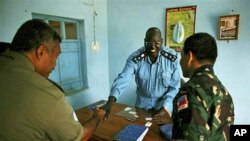International observers have arrived in southern Sudan for a January referendum that could see the country split in two. While analysts fear that stalled North - South negotiations could jeopardize the critical vote, U.S. officials say the two are nearing an agreement on critical issues.
Sixteen international election observers have been deployed from the U.S.-based Carter Center to evaluate the January 9 referendum on secession in Southern Sudan.
The observation team arrives in Sudan amid growing international fear of renewed violence as a result of the poll. With just over 100 days remaining, preparations for the January referendum are falling far behind schedule. Voter registration, originally due to finish in August, has yet to begin and analysts have warned that any delay in the referendum is likely to spark renewed clashes between the two sides.
On Tuesday Referendum Commission chairman Mohamed Ibrahim Khalil revealed that registration would be delayed further and would likely begin on November 15.
But the Carter Center's Sudan director Sanne van den Bergh said there have been encouraging signs of progress in recent weeks.
"It is too early to draw any conclusions and we will wait for reports from our observers to come in but we did congratulate the commission on appointing all the members of the State High Committee in the 10 southern states and the commencement of printing of the voter registration materials," said Sanne van den Bergh. "There are some important steps to be taken to actually move forward to the first major benchmark, which is the voter registration."
According to van den Bergh, some issues that needed to be addressed included the Referendum Commission budget, which has yet to be approved. Van den Bergh said rapid dispersal of the commission's funds would allow the commission to begin hiring and training staff needed to administer the vote.
The Carter Center, founded by former U.S. president Jimmy Carter, is sending four two-man teams to southern Sudan, three to the north and one to the contested border region of Abyei.
While traditionally considered part of northern Sudan, Abyei residents are divided and the region will hold a separate referendum on January 9th to determine its allegiance should the south choose independence.
Abyei holds large deposits of oil and lies between three Sudanese states. It is caught in contentious negotiations on North-South border demarcation mandated under the 2005 peace agreement.
The Brussels-based International Crisis Group says stalled border negotiations have "poisoned" the atmosphere surrounding talks on other critical issues such as oil-revenue sharing. The group warned that these issues could provide another path to war if not resolved.
Such warnings are starting to reach the international community. At last week's United Nations General Assembly in New York, world leaders including U.S. President Barack Obama held a Sudan Summit to bring the two sides together. US Assistant Secretary of State P.J. Crowley said on Tuesday the meeting established a foundation for resolving issues surrounding Abyei. Crowley revealed that another meeting would be held in October in the Ethiopian capital, Addis Ababa, where an agreement was expected.
The January 9 referendum is the final provision of the Comprehensive Peace Agreement, which ended more than 20 years of civil war between the Sudanese government and southern rebels. While the agreement was intended to promote unity, southern voters are widely expected to choose independence.
More International Observers Arrive In Sudan




